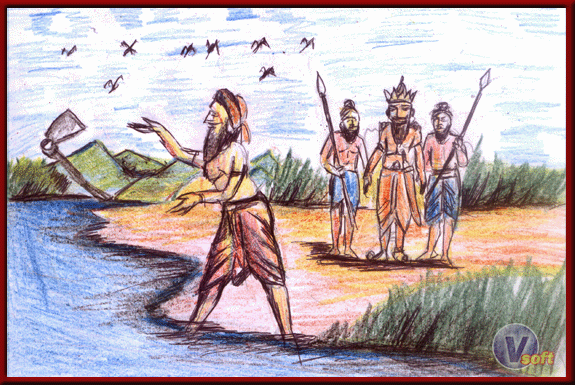317. The Gardener Who Threw Away His Spade

Once upon a time when Brahmadatta was reigning in Benares, the Bodhisatta came to life again as a gardener, and grew up. ‘Spade Sage’ was his name. With his spade he cleared a patch of ground, and grew pot herbs, pumpkins, gourds, cucumbers, and other vegetables. By selling them, he made a sorry living. Except the spade he had nothing in the world!
Resolving one day to forsake the world for the religious life, he hid his spade away, and became a recluse. But thoughts of that spade rose in his heart and the passion of greed overcame him, so that for the sake of his blunt spade he reverted to this world. Again and again this happened; six times he hid the spade and become a recluse, only to renounce his vows again. But the seventh time he thought how that blunt spade had caused him again and again to backslide; and he made up his mind to throw it into a river before he became a recluse again. So he carried the spade to the river side. Shutting his eyes tight, he whirled the spade thrice round his head by the handle and threw it with the strength of an elephant right into mid stream. Then he shouted loud, “I have conquered! I have conquered!”
Now just at that moment the King of Benares, on his way home from quelling disorder on the border, was riding along in all his splendour on the back of his elephant. When he heard the Bodhisatta’s shout of triumph. The king said, “who is proclaiming that he has conquered. I wonder whom he has conquered. Go, bring him before me.”
So the Bodhisatta was brought before the king, who said to him, “My good man, I am a conqueror myself; I have just won a battle and am on my way home victorious. Tell me whom you have conquered.” The Bodhisatta said, “Sir! Thousands of victories as yours are vain, if you have not achieved victory over the lusts within your self. It is by conquering greed within myself, that I have conquered my lusts.” And as he spoke, he gazed upon the great river. By duly concentrating all his mind upon the idea of water won insight. Then by virtue of his newly won transcendental powers he rose in the air, and, seated there, instructed the king in the Truth.
Even as he listened to the Truth, light shone in on the king’s darkness, and the lusts of his heart were quenched; his heart was bent on renouncing the world; then and there the lust for royal dominion passed away from him. The king asked the Bodhisatta, “Where will you go now?”
The Bodhisatta replied, “To the Himalayas, sir; there to live the anchorite’s life.” The king said, “Then I will also become an anchorite.” The king departed with the Bodhisatta. And with the king, all the people in the kingdom followed the Bodhisatta.
Then the throne of Sakka, King of Devas, became hot beneath him. Looking out, he saw that the spade sage was engaged upon a great Renunciation. Marking the numbers of his following, Indra thought how to house them all. And he sent for Vissakamma, and ordered him to construct a residence to Bodhisatta and his followers. Vissakamma said,”It shall be done sire.” He went and did what was told to him.
(What follows is only a summary; the full details will be given in the Hatthipala Jataka, which forms one narrative with this.)
Vissakamma caused a hermitage to arise in the hermit’s demesne; drove away all the noisy beasts and birds and fairies; and made in each cardinal direction a path just broad enough for one person to pass along it at a time.
The Spade sage with his host of people came to the Himalayas and entered the demesne which Indra had given and took possession of the house which Vissakamma had created for the hermits. First of all he renounced the world himself, and afterwards made the people renounce it. Then he portioned out the demesne among them. They abandoned all their sovereignty and the whole thirty leagues of the demesne were filled. By due performance of all the other rites that conduce to insight, the spade sage developed perfect good will within himself, and he taught the people how to meditate. Hereby they all won the Attainments, and assured their entry thereafter into the Brahma Realm, whilst all who ministered to them qualified for entry thereafter into the Realm of Devas.


Leave a Reply